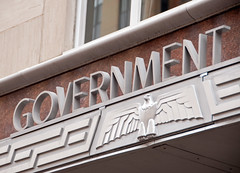“Expedite services. Citizens are used to paying more when they’re running behind— that’s what FedEx one-day shipping is all about. Think about adding expedited surcharges for items like business or building permits and nursing license permit renewals,to name a few.”Even worse,
“What if businesses, citizens or nonprofits could pay $149 per year for a special phone number that the best government customer service staff member will answer promptly? What if you could get a “government concierge” to walk you through the paperwork needed to start a small business and navigate you through all the departments? Everyone would pay for that.”“Answer promptly”? “Best government customer service staff member”? “Everyone would pay for that”? Guess what, we already do. Many of the things that he proposes should be an automatic part of providing good service to citizens.Offering good service at an additional cost legitimizes mediocre service by government. It sends the message to constituents that government can do better, but can’t be bothered.
Government need to be cautious about providing better service as a premium because it could make it available only to a limited number of citizens, potentially making “regular” people suffer with poor service and possibly wait even longer as they're served after those with the premium service. There should be a mechanism for a fast track, but an emergency service and the rate should discourage use as a premium channel. As an emergency services, turn around times should reflect this, making waits less than a week depending on complexity. To get an expedited US passport is an additional $60, however the wait is still estimated at 2-3 weeks versus the 4-6 weeks of regular processing. The fee should be justified by a true benefit.
Government also needs to be cautious about requiring people to go through a particular channel or pay a fee. This could have the effect (intentional or not) of discriminating against particular individuals or groups. He gives the example of his bank, well, the biggest difference between government and business is that you can choose a different business. For individuals with disabilities, the elderly, technically illiterate or those without computers, forced channels could mean the difference between getting a a service or being penalized or going without.
There are many things government could learn from business. However, government has different standards of service and responsibility. "Customers" have already paid for the service, and when they come in contact with a government agency, they expect good service (as they should).
Getting creative generating revenue doesn’t have to mean scalping your constituents. Giving them better more efficient ways to accomplish their needs saves money. For every person who registers their car, pays a fine or buys a fishing license on-line, there’s money saved. There’s no need to add a fee to it. If a client can get their questions answered on-line or quickly by a knowledgeable person, there’s money saved.
It’s not always about improving income, it’s also about reducing waste and increasing efficiency.
Image used with permission from KevinH

No comments:
Post a Comment